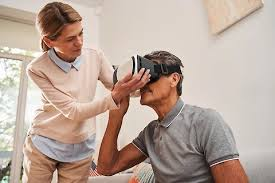Technology in mental health care
Technology in mental health care
Advancements in technology have greatly impacted the field of mental health care, providing new opportunities for treatment, diagnosis, and therapy. Here are some ways in which technology is changing mental health care:
Teletherapy:
With the rise of video conferencing and telemedicine, teletherapy has become an increasingly popular option for individuals seeking mental health treatment. It allows people to receive therapy from the comfort of their own homes, eliminating the need for in-person visits, which can be especially beneficial for those who live in remote areas or have difficulty leaving their homes due to physical or mental health conditions.Mobile apps:
There are now a plethora of mental health apps available for smartphones and tablets that offer support and resources for individuals struggling with mental health issues. These apps can help with everything from mindfulness and meditation to tracking moods and symptoms.Virtual reality therapy:
Virtual reality technology is being used to treat a range of mental health conditions, including anxiety, PTSD, and phobias. By creating a virtual environment that simulates a feared situation, individuals can gradually desensitize themselves to the triggers that cause their anxiety or fear.Wearable devices:
Wearable devices like smartwatches and fitness trackers can help individuals track their physical activity, sleep patterns, and heart rate, which can provide insights into their mental health. Some devices even have features that can detect changes in mood and alert individuals to seek additional support.Online support groups:
Online support groups provide individuals with a safe space to connect with others who are going through similar struggles. These groups can be especially beneficial for individuals who may not have access to in-person support or feel uncomfortable sharing their experiences in a traditional therapy setting.Artificial intelligence:
AI-powered chatbots and virtual assistants are being used to provide mental health support and resources to individuals. These tools can offer personalized recommendations and advice based on an individual's specific needs and symptoms.
Technology has opened up new avenues for mental health treatment and support, providing individuals with more options for care and increasing accessibility to services. However, it's important to note that technology should never replace traditional mental health care, and individuals should always consult with a mental health professional for a proper diagnosis and treatment plan.









Comments
Post a Comment